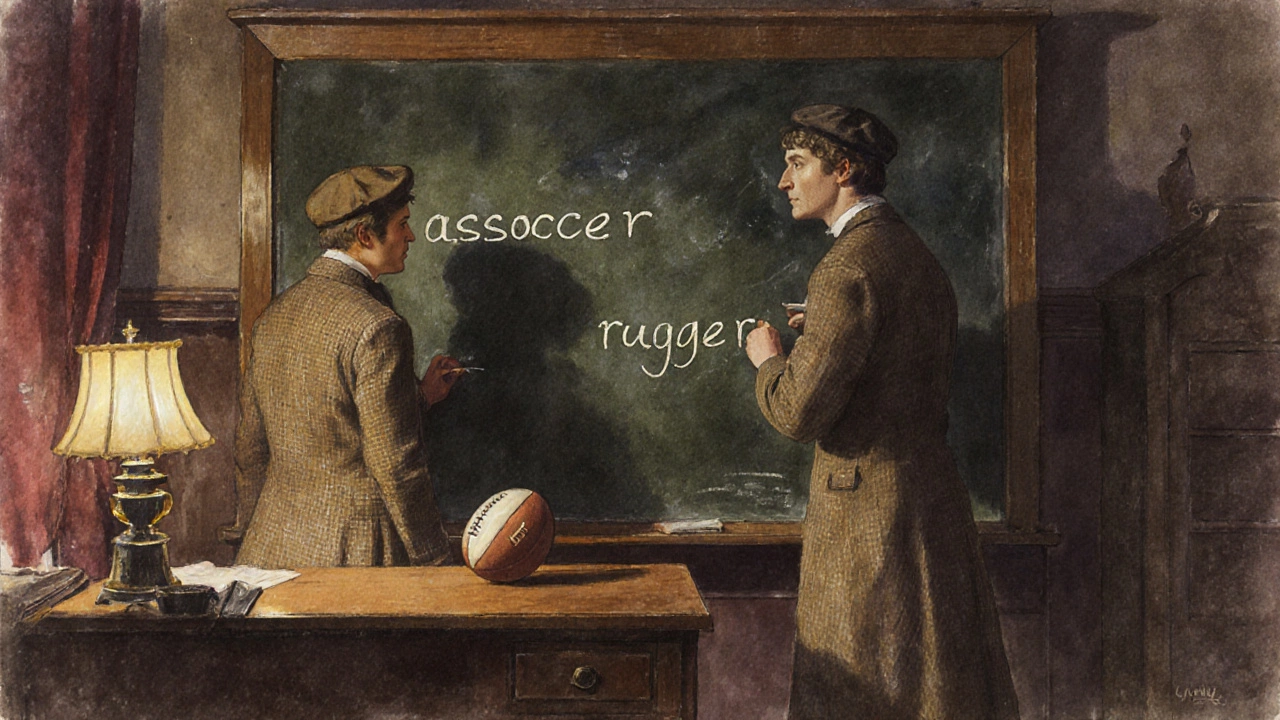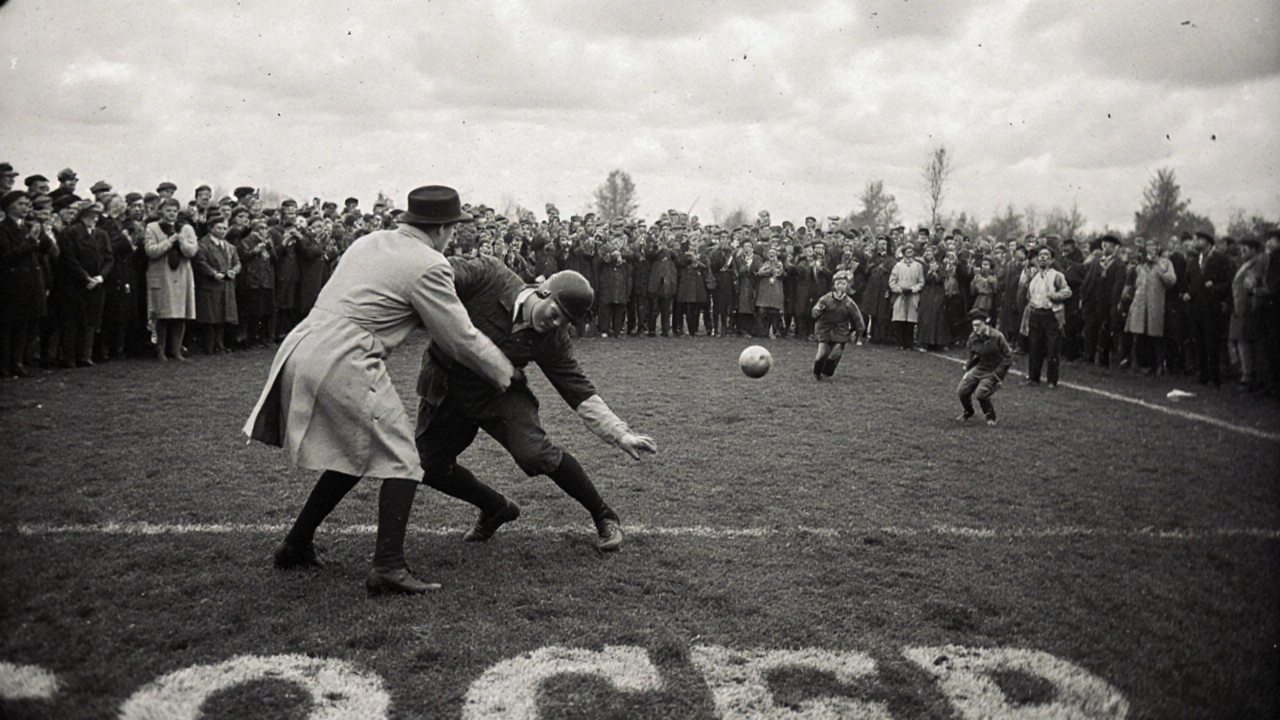Why Do Americans Say Soccer? The Real Story Behind the Name

Ask an American what sport they watch on Sunday and they’ll say football. Ask them what their kid plays after school and they’ll say soccer. It’s confusing - until you know the history.
The British Root of the Word
The word "soccer" didn’t come from America. It was born in England in the 1800s. Back then, there were different versions of football being played in schools and clubs. Some teams played with hands, others only with feet. To tell them apart, students at Oxford University started shortening the names.
"Association Football" became "assoc" - then "assoccer" - and finally "soccer." "Rugby Football" became "rugger." It was slang, not official. But it stuck. By the 1890s, "soccer" was commonly used in Britain to mean the game we now call football.
At the time, the Football Association (FA), founded in 1863, was the governing body for the sport. The rules were written to ban handling the ball. That’s what made it different from rugby. And "soccer" was the everyday term people used to describe it.
Why Did Britain Drop "Soccer"?
By the 1970s, "soccer" started sounding strange in Britain - not because it was wrong, but because it started sounding American. As the U.S. began to build its own soccer culture, British media began avoiding the word. It felt like an export. A foreign label for something British.
By the 1980s, British newspapers and broadcasters had fully switched to "football." The term "soccer" was seen as outdated, or worse - Americanized. The irony? Americans didn’t invent the word. They just kept using it while Britain let it fade.
How Did America Get Stuck With "Soccer"?
When football arrived in the U.S. in the late 1800s, it wasn’t the only version around. American colleges were already playing their own hybrid game - one that allowed carrying the ball, tackling, and forward passing. That game evolved into what we now call American football.
By the 1920s, "football" in America meant the gridiron version. It was popular on campuses, in the press, and on radio. When the British version of football came over - the one with no helmets, no blocking, just kicks and passes - it needed a name to avoid confusion.
So people started calling it "soccer." It was practical. Clear. Distinct. And it stuck.
Even today, if you say "football" in the U.S., most people think of the NFL. Not Lionel Messi. Not the World Cup. It’s a different sport with a shared name. "Soccer" became the only way to mean the global game without ambiguity.

It’s Not About Language - It’s About Identity
The difference isn’t just linguistic. It’s cultural. In the U.S., "football" is tied to Thanksgiving, tailgates, and Super Bowl parties. It’s a national ritual. In the UK, "football" is tied to local rivalries, terraces, and the FA Cup. It’s woven into community identity.
When Americans say "soccer," they’re not rejecting British culture. They’re preserving clarity. They’re saying: "This game is different from the one we call football."
It’s the same reason Australians call rugby "league" and "union," or why Canadians say "football" for their own version of the game. Language adapts to avoid confusion - not to insult.
Why Does It Still Annoy People?
Many football fans outside the U.S. roll their eyes at "soccer." They think it’s silly, unnecessary, even disrespectful. But that’s a misunderstanding.
The U.S. didn’t rename the sport to be different. It renamed it to be accurate. There are four major football codes in the world: association football, American football, rugby league, and rugby union. Each has its own name in its home country. No one calls American football "gridiron" in the U.S. - but they don’t call it "football" in the UK, either.
Calling it "soccer" isn’t ignorance. It’s context.
The World Cup Effect
As the World Cup grew in popularity, American broadcasters had to find a way to explain the game to audiences who only knew football as a violent, helmeted sport. They used "soccer" - and it worked.
By the 1990s, the U.S. hosted the 1994 World Cup. Millions watched. Kids started playing. MLS launched in 1996. Suddenly, "soccer" wasn’t just a label - it was a movement.
Today, over 3 million kids play organized soccer in the U.S. That’s more than baseball, basketball, or hockey. And nearly every parent, coach, and kid calls it soccer. Not because they’re stubborn. Because it’s the only word that fits.

What About FIFA?
FIFA - the Fédération Internationale de Football Association - uses "football" in all its official documents. But that’s because it’s an international body. It doesn’t dictate local language.
Just like the United Nations doesn’t force every country to speak French, FIFA doesn’t force Americans to say "football." The U.S. Soccer Federation even uses "soccer" in its name - because that’s what the public understands.
It’s not a rebellion. It’s a translation.
So Is "Soccer" Wrong?
No. "Soccer" is just a word. And words change meaning depending on where you are.
In the UK, "football" means the global game. In the U.S., "soccer" means the same thing. Neither is right or wrong. Both are correct - in their context.
If you’re in London and say "I’m going to the soccer," people will think you’re joking. If you’re in Chicago and say "I’m going to the football," people will think you’re talking about the Bears.
It’s not about language purity. It’s about communication.
What’s Next?
Younger Americans are starting to say "football" more often - especially those who grew up watching the Premier League or followed the World Cup closely. Social media, streaming, and global fandom are blurring the lines.
But "soccer" isn’t going anywhere. Not yet. Not while American football still dominates the airwaves. And not while millions of parents still sign their kids up for "soccer camp" and buy "soccer cleats."
Language evolves slowly. And in this case, it evolved because two countries needed two names for two different games.
So next time someone tells you Americans are wrong for saying "soccer," tell them this: They’re not wrong. They’re just speaking a different version of the same language - one shaped by history, not ignorance.
Why do Americans call it soccer instead of football?
Americans call it soccer to avoid confusion with American football, which is the dominant version of football in the U.S. The term "soccer" comes from British slang for "association football," and it stuck in America because it clearly distinguished the two sports.
Is "soccer" an American invention?
No, "soccer" is not an American invention. It originated in England in the late 1800s as a shortened form of "association football." British students at Oxford University coined the term to differentiate it from rugby football. Americans adopted it later to avoid confusion with their own version of football.
Why did the UK stop using "soccer"?
The UK stopped using "soccer" in the 1970s and 80s because it became associated with American English. British media began seeing it as an outsider term for a British sport. "Football" was already the established word, so they dropped "soccer" to reclaim it as their own.
Does FIFA use the word "soccer"?
FIFA, the international governing body, uses "football" in all official documents and communications because it’s the global standard. But it doesn’t control local language use. In the U.S., the official organization is called the U.S. Soccer Federation - because that’s what the public understands.
Will Americans eventually switch to calling it football?
Some younger Americans already do, especially those influenced by global media. But "soccer" remains dominant because American football is still the most popular football code in the country. Until that changes, "soccer" will stay the clear, unambiguous term for the global game.
